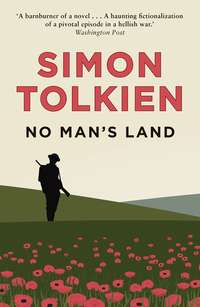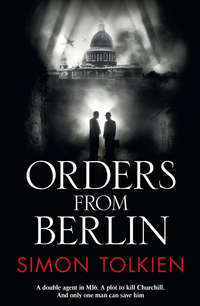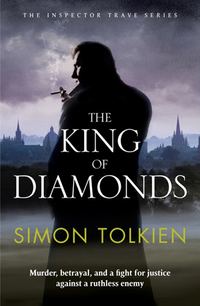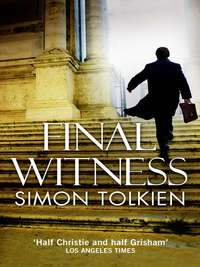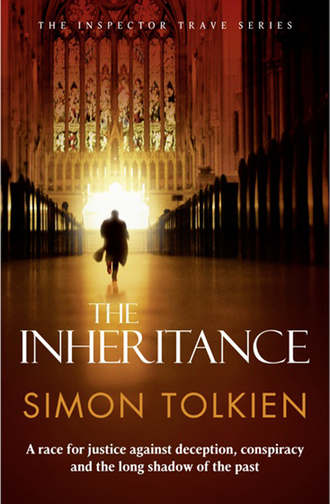
Полная версия
The Inheritance

SIMON TOLKIEN
The Inheritance

For my mother, Faith Tolkien
Table of Contents
Title Page
Dedication
Introductory Note
Prologue: Normandy 1944
Part One: 1959
Chapter 1
Chapter 2
Chapter 3
Chapter 4
Chapter 5
Chapter 6
Chapter 7
Chapter 8
Chapter 9
Chapter 10
Chapter 11
Chapter 12
Chapter 13
Chapter 14
Part Two
Chapter 15
Chapter 16
Chapter 17
Chapter 18
Chapter 19
Chapter 20
Part Three
Chapter 21
Chapter 22
Chapter 23
Chapter 24
Chapter 25
Chapter 26
Chapter 27
Chapter 28
Chapter 29
Acknowledgments
About the Author
Also by Simon Tolkien
Copyright
About the Publisher
INTRODUCTORY NOTE
The controversial executions of Derek Bentley and Ruth Ellis in the 1950s increased public pressure in the United Kingdom for the abolition of hanging, and this was answered in part by the passing of the Homicide Act in 1957, which limited the imposition of the death penalty to five specific categories of murder. Henceforward only those convicted of killing police officers or prison guards and those who had committed a murder by shooting or in the furtherance of theft or when resisting arrest could suffer the ultimate punishment. The effect of this unsatisfactory legislation was that a poisoner or strangler acting with premeditation would escape the rope, whereas a man who shot another in a fit of rage might not. This anomaly no doubt helped the campaign for outright abolition, which finally reached fruition with the passage of the Murder (Abolition of Death Penalty) Act in 1965.
Death sentences were carried out far more quickly in England in the 1950s than they are in the United States today. A single appeal against the conviction but not the sentence was allowed, and, if it failed, the Home Secretary made a final decision on whether to exercise the royal prerogative of mercy on behalf of the Queen, marking the file ‘the law must take its course’ if there were to be no reprieve. There was often no more than a month’s interval between conviction and execution. Ruth Ellis, for example, spent just three weeks and three days in the condemned cell at Holloway Prison in 1955 before she was hanged by Albert Pierrepoint for the crime of shooting her boyfriend.
There was thus very little time available for lawyers or other interested parties trying desperately to uncover new evidence that might exonerate a client sentenced to die. They were quite literally working against the clock.
PROLOGUE
NORMANDY
1944
They were safe in the trees, waiting for the Germans to come. Carson had driven the Jeep off the drive, and the silver-grey branches had crackled and broken as he’d wedged it into its hiding place. And now they waited on either side of the road with their fingers on the triggers of their American-made machine guns. Nothing. No wind in the trees, no movement in the air, until just after eight o’clock, when the dust came up in a yellow cloud and the two trucks came round the corner.
And then Ritter felt the bullets feeding through the magazine, the quick vibrations in his arms from the gun, and saw the men in the trucks jumping up and down like puppets. There was one young soldier at the end who ran away down the road, but Colonel Cade walked out of the trees with his rifle and shot him in the back of the head just before he reached the corner. It was a good ambush.
Afterwards, Carson and Ritter pushed the trucks into the woods, while the colonel selected rifles and pistols from the bodies of their dead owners. Three of each. He made them leave their own guns behind.
And so they walked on up to the house with the dead soldiers’ rifles slung over their shoulders and the snub-nosed German Mauser pistols in their pockets. They were a strange, ill-assorted group. Walking in the middle, the tall, thin colonel towered over his two companions. His pale blue eyes were almost opaque, revealing nothing of the man inside, and his long aquiline nose gave him an ascetic look that seemed oddly at variance with his uniform. And yet he carried himself with an air of natural authority that made it obvious that he was the man in charge.
On the colonel’s right, Sergeant Ritter was far more clearly a military man with his clipped black moustache and polished shoes and buttons. He was a big man and he had begun to sweat in the evening heat. But he didn’t complain. He knew that they had work to do. Looking past the colonel, Ritter glared over at Corporal Carson, who was walking with a deliberate swagger, swaying his narrow hips and shoulders as he expertly flicked a piece of chewing gum from one side of his mouth to the other in time with each step he took. The young man’s disrespect disgusted Ritter. But he kept his peace. Carson had been the only soldier he could find to do the job. He’d have to do.
They walked past green stony fields and rows of overgrown vines until they came to a fork in the drive and passed an old sign on which someone had once upon a time painted the words ‘Proprieté Priveé.’ It was nailed to the trunk of a plane tree, and Carson read it out loud in his cockney accent and laughed like it was some kind of joke. But the colonel ignored him. He had other things on his mind.
One more turning and the trees stopped suddenly on both sides, and there was the house. It was much smaller than Ritter had expected – not his idea of a château at all. The glass was broken in several of the small windows that appeared at regular intervals in the stone façade, and the guttering was hanging loose from one corner of the roof. Over to the left, a solitary black-and-white cow stood in the shade of a primitive lean-to. Her great red tongue was lolling out of her mouth, and she had clearly been suffering in the afternoon heat. It was unusual for the time of year, and Ritter wondered inconsequentially whether she was aware of the lake that stretched out like a sheet of black glass several hundred yards beyond the house. On the far shore, the town of Marjean shimmered in the distance.
The church stood on a ridge above the château, and it was clearly the more impressive of the two buildings. Even Ritter could sense its antiquity. The bell tower glowed silver in the translucent evening light, and the gargoyles – devils and apes with deformed backs and monstrous faces – gaped down at the world below.
There had been devils here already – German devils – but they seemed to have left the church well alone. A swastika flag hung limply from a pole standing near the corner of the house, and a litter of papers on the dried-up lawn bore witness to the suddenness of the Germans’ departure. But their hosts had remained behind, and Henri Rocard and his wife were already standing in the doorway of their house when the three British soldiers came out of the trees and walked across the grass towards them.
It was the colonel who did the talking, and Ritter understood almost none of it, but then again he didn’t need to. He knew already that the colonel wanted something from these people, and he was here to help the colonel get it, if the colonel needed help. Back at the camp outside Moirtier, Cade had already explained that he was prepared to pay good money for what he wanted. More than the thing was worth. It was Rocard who was being unreasonable.
Ritter didn’t like the look of the Frenchman. He was thick and short, built like one of those middleweights that Ritter had gone to watch in Nottingham when he was a boy. And his dark eyes were small, staring out suspiciously from his wrinkled face. He had probably not yet turned fifty, but the sun had burnt his skin to a pale leather, ageing him beyond his years.
Madame Rocard seemed to be a little older than her husband, but she remained an attractive woman. She stood up straight, and her black hair was pulled back severely from her well-shaped face. She was full-breasted and defiant, and Ritter would have liked to have pushed her back into the cool interior of her house, down onto the red flagstones in the hall, and fucked her until he’d had his fill. They were collaborators, and they deserved everything that was coming to them – unless they were reasonable. And the anger in the squat little Frenchman’s voice, his evident hostility towards the colonel, didn’t make a peaceful solution seem likely.
Suddenly the colonel went forward and took hold of the Frenchwoman’s arm, pulling her towards him. And in the same movement, he took the German pistol out of his pocket and pushed it hard against the side of her handsome head. But still Rocard refused to give way, even when Cade let go of the woman’s arm and used his free hand to pull back the hammer of the gun.
Quick movement and sudden stillness. This was how Ritter remembered it all afterwards. The silence in the trees shattered by the sudden rat-a-tat-tat of the machine guns. And now the angry foreign words, followed by the colonel’s seizure of the woman, seemed to leave them all immobilized, frozen in a tableau of fear.
It was the dog that broke the stand-off. It must have been barking for some time, tied up somewhere inside the house, and Ritter was surprised that he hadn’t heard it before. All his attention must have been focused on the scene in the doorway. It was a black mongrel dog almost as big as a Labrador, and it came at them suddenly, its lip curled back over its yellow teeth. But it never got to bite anyone. The colonel had wonderfully quick reactions back then, and he pulled the gun down from the Frenchwoman’s ear and killed the animal with a single bullet.
It was funny that it was the dead dog, and not the threat to his wife, that cracked the Frenchman’s resolve. Or perhaps it was the killing of the dog that made him believe that the colonel would really kill his wife. Whatever the truth, they did not need to do any more. Rocard agreed to give the colonel what he wanted.
‘He’s going to get something for me, from inside the house,’ said the colonel to Ritter. ‘You go with him, Reg, and watch what he does. Check he hasn’t got a gun, and make sure he doesn’t get one while he’s in there.’
The Frenchman didn’t react when Ritter patted him down. He just kept his eyes fixed on his wife and on the gun that the colonel had brought back up to the side of her head straight after he’d killed the dog. Rocard had nothing in his pockets. Not even a penknife. But Ritter didn’t trust him, and he kept close behind when the Frenchman went back into the house, pressing the muzzle of his gun into Rocard’s back, feeling out the concave hollow between his shoulder blades.
It was cool inside. Crossing the hall, Rocard started up a narrow staircase in the corner and Ritter, following behind, found himself stepping from light into semi-darkness and back, again and again, as they crossed pools of evening sunlight let in by the small rectangular windows set high in the walls of the house. In the rooms on either side Ritter could see evidence of the Germans’ recent occupation – a photograph of the Führer hanging slightly askew on a whitewashed wall, a trestle bed lying overturned on its side, and papers, both handwritten and typed, strewn about everywhere. On one of the desks Ritter noticed the remains of someone’s supper – a crust of black bread and a half-eaten German sausage. The man who’d been eating it only an hour before was now lying in a pool of blood halfway down the drive, baking in the last of the sun. The thought made Ritter smile. Life was a funny thing sometimes.
They carried on up the stairs to a room at the very top. It was almost an attic, and Ritter had to half-stoop to get through the door. This was evidently where Rocard and his wife slept – the only place left to them after the house was occupied, and the bed was the main piece of furniture. It was old and ornate, with elaborate carving on its four posters, but it had lost its canopy and the coarse army-issue blankets covering it were out of keeping with its grand design. It took all Rocard’s strength to move it away from the wall, but he didn’t ask for any help, and he didn’t try to hide what he was doing when he pulled up one of the rough floorboards that he had exposed. Underneath, Ritter saw over the Frenchman’s shoulder that the hollow space contained an old thin book in a heavy leather binding. Wasting no time, he seized the book out of Rocard’s hands.
On the way back down, the Frenchman remained compliant until they turned a corner of the stairs and started down the final flight into the hall. Then, suddenly, there was an outbreak of shouting from beyond the entrance to the living room, and a second later Ritter caught sight of Carson framed in the doorway, and below and to the side of him an old man half-shouting, half-kneeling on the floor. He looked to be in his seventies, but he could have been older. Time seemed to have been kind to him up until now. He’d kept his teeth, and his hair hadn’t fallen out but had instead turned bright white with age. Now, however, Carson was using it to half-drag, half-pull him toward the front door. Halfway across the flagstones, Carson noticed Ritter on the stairs and laughed.
‘Here’s the old sod that let the dog out,’ he shouted to make himself heard above the old man’s cries of pain. ‘The colonel saw him peeping out the window and sent me in to bring him out. On all fours was my idea. Just like his fucking dog.’
Carson’s antics enraged the Frenchman. Seeing his old servant reduced to a howling animal, he started forward down the stairs, and Ritter had to drop the book and seize Rocard by the collar of his shirt to pull him back. At the same time he thrust the barrel of the gun hard into the small of Rocard’s back, and now the Frenchman stood almost doubled up with pain at the foot of the stairs, powerless to help his old servant as Carson dragged him out of the house, administering several kicks to the old man’s back and ribcage before he dumped him on the ground at the colonel’s feet, beside the dead dog.
‘He was hiding behind one of the big heavy curtains in there,’ said Carson, pointing back at the house. ‘And it was him that let the dog out. I found him with this bit of rope in his hands. Why don’t we use it to string him up? What do you say, Colonel? Let’s teach these Frenchies a lesson.’
‘That won’t be necessary, Corporal,’ said the colonel acidly. Carson was joking, but he had no time now for the man’s petty sadism. All his attention was focused on Ritter and the Frenchman. ‘Did you get it, Reg?’ he asked. ‘Show me what you got.’
‘Just this old book. He had it under the floorboards,’ said Ritter, handing over the thin leather-bound volume that he had seized from the Frenchman up in the attic. ‘Is that what you wanted?’
The colonel didn’t reply. His hands were shaking as he took the book from Ritter and let go of the Frenchman’s wife. She immediately went over to the old servant and raised him unsteadily to his feet. He couldn’t stand unsupported, but Carson did nothing to help her. He was still trying to control his laughter.
The colonel turned the pages quickly but carefully, ignoring the dust that flew up into his eyes.
‘It’s the codex, all right,’ he said as if to himself. ‘From the moment I read that letter in Rome, I knew it was here. Here all the time.’
‘Colonel,’ interrupted Ritter. They needed to decide what they were going to do with these people before someone from the regiment came looking for them.
‘Colonel, it’s getting late,’ he tried again a moment later.
This time Cade looked up from the book. ‘Where did you say it was, Reg?’ he asked, as if he hadn’t heard Ritter’s question.
‘In a hollow space under one of the floorboards in their bedroom,’ said Ritter.
‘Was there anything else in there? In the space?’
‘No. I checked.’
Still, the colonel seemed dissatisfied. He closed the book and began speaking to the Frenchman in his own language again. Quickly. Question after question. Ritter could understand almost nothing of what was being said, but it was obvious that the colonel was getting angry. He kept repeating a word that sounded like roi or croix in a voice that demanded a response, but it was a one-way conversation. The Frenchman raised his hands several times in a gesture that seemed to imply that he didn’t understand what the colonel was talking about, and then after a while he just looked away.
Suddenly the colonel took hold of the woman again, squeezing her wrist and saying that same word over and over again. Croix or roi. Roi was a king, and Ritter didn’t know what a king had to do with it, but perhaps that wasn’t the word. The woman struggled, and Ritter was about to go over to help restrain her, when she threw her head back and spat at the colonel full in his face. It made him drop the book, and he used his freed hand to slap her hard across both cheeks. They were hard blows and she fell to the ground, weeping.
‘We’ve got to decide what to do, Colonel,’ said Ritter. He felt worried now. The sun had almost set and they needed to stay in radio contact with the camp. The colonel seemed to be getting nowhere with the Frenchies.
‘All right, Reg, I know that,’ said the colonel. ‘It’s just that they know more than they’re saying. A little bit longer and I can get it out of them. I can feel it. Help me take them over to the church. We can work on them in there. And you, Carson, come up there with us and keep a lookout. We won’t be long.’
CHAPTER 1
Detective Inspector William Trave of the Oxfordshire CID felt the pain as soon as he’d passed through the revolving entrance doors of the Old Bailey and had shaken the rain out from his coat onto the dirty wet floor of the courthouse. It hurt him in the same place as before – on the left side of his chest, just above his heart. But it was worse this time. It felt important. Like it might never go away.
There was a white plastic chair in the corner, placed there perhaps by some kind janitor to accommodate visitors made faint by their first experience of the Old Bailey. Now Trave fell into it, bending down over his knees to gather the pain into himself. He was fighting for breath while prickly sweat poured down in rivulets over his face, mixing with the raindrops. And all the time his brain raced from one thought to another, as if it wanted in the space of a minute or two to catch up on all the years he had wasted not talking to his wife, not coming to terms with his son’s death, not living. He thought of the lonely North Oxford house he had left behind at seven o’clock that morning, with the room at the back that he never went into, and he thought of his ex-wife, whom he had seen just the other day shopping in the Covered Market. He had run back into the High Street, frightened that his successor might come into view carrying a shared shopping bag, and had ducked into the Mitre in search of whisky.
Trave wanted whisky now, but the Old Bailey wasn’t the place to find it. For a moment he considered the possibility of the pub across the road. It was called The Witness Box, or some fatuous name like that, but it wouldn’t be open yet. Trave felt his breath beginning to come more easily. The pain was better, and he got out a crumpled handkerchief and wiped away some of the sweat and rain. It was funny that he’d felt for a moment that he was actually going to die, and yet no one seemed to have noticed. The security guards were still patting down the pockets of the public just like they had been doing all morning. One of them was even humming a discordant version of that American song, ‘Heartbreak Hotel.’ A rain-soaked middle-aged policeman sitting on a chair in the corner, gathering his breath for the day ahead, was hardly a cause for distraction.
A sudden weariness came over Trave. Once again he felt weighed down by the meaninglessness of the world around him. Trave always tried to keep his natural nihilism at bay as best he could. He did his job to the best of his ability, went to church on Sundays, and nurtured the plants that grew in the carefully arranged borders of his garden – and sometimes it all worked. Things seemed important precisely because they didn’t last. But underneath, the despair was always there, ready to spring out and take him unawares. Like that morning, halfway down his own street, when a young man in blue overalls working on a dismembered motorcycle had brought back the memory of Joe as if he had gone only yesterday. And fallen apples in the garden at the weekened had resurrected Vanessa stooping to gather them into a straw basket three autumns before. It was funny that he always remembered his wife with her back turned.
Trave gathered himself together and made for the stairs. When he got time, he’d go and see his doctor. Perhaps the GP could give him something. In the meantime he had to carry on. Today was important. Regina v. Stephen Cade, said the list on the wall outside the courthouse. Before His Honour Judge Murdoch at twelve o’clock. Charged with murder. Father murder – patricide, it was called. And the father was an important man – a colonel in the army during the war and a university professor in civilian life. If convicted, the boy would certainly hang. The powers that be would see to that. The boy. But Stephen wasn’t a boy. He was twenty-two. He just felt like a boy to Trave. The policeman fought to keep back the thought that Stephen was so much like Joe. It wasn’t just a physical resemblance. Joe had had the same passion, the same need to rebel that had driven him to ride his brand new 600cc silver motorcycle too fast after dark down a narrow road on the other side of Oxford. A wet January night more than two years ago. If he’d lived, Joe would be twenty-two. Just like Stephen. Trave shook his head. He didn’t need the police training manual to know that empathizing with the main suspect in a murder investigation was no way to do his job. Trave had trained himself to be fair and decent and unemotional. That way he brought order to a disordered world, and most of the time he believed there was some value in that. He would do his duty, give his evidence, and move on. The fate of Stephen Cade was not his responsibility.
Up in the police room, Trave poured himself a cup of black coffee, straightened his tie, and waited in a corner for the court usher to come and get him to give his evidence. He was the officer in the case, and, when the opening statements were over, he would be the first witness called by the prosecution.
The courtroom was one of the oldest in the Old Bailey. It was tall, lit by glass chandeliers that the maintenance staff needed long ladders to reach when the bulbs blew out. On the wood-panelled walls, pictures of long-gone nineteenth-century lawyers stared out on their twentieth-century successors. The judge sat robed in black in a leather-backed armchair placed on a high dais. Only the dock containing the defendant and two uniformed prison officers was at the same level. Between them, in the well of the court, were the lawyers’ tables; the witness box; and, to right and left, the benches for the press and the jury. The jurors were now in place, and Trave felt them slowly relaxing into their new surroundings. Their moment in the limelight, when they stumbled over their oath to render a true verdict in accordance with the evidence, had come and gone. Now they could sit in safe anonymity while the drama of the murder trial played out in front of them. Everyone – members of the press, the jurors, and the spectators packed together in the public gallery above the defendant’s head – was focused on the prosecutor, Gerald Thompson, as he gathered his long black gown around his shoulders and prepared to begin.




